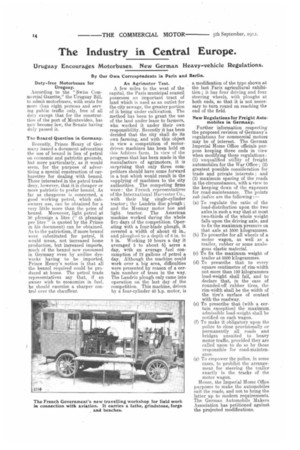The Industry in Central Europe.
Page 16

If you've noticed an error in this article please click here to report it so we can fix it.
Uruguay Encourages Motorbuses. New German Heavy-vehicle Regulations.
By Our Own Correspondents in Paris and Berlin.
Duty-iree Motorbuses for Uruguay.
According to the "Swiss Commercial Gazette," the Uruguay Bill, to admit motorbuses, with seats for more i han eight persons and serving public traffic only, free of all duty except that for the construction of the port of Montevideo, has now become law, the Senate having • duly passed it.
The Benz ol Question in Germany.
Recently, Prince Henry of Germany issued a document advocating the use of benzol in lieu of petrol on economic and patriotic grounds, but more particularly, as it would seem, for the purpose of advertising a special construction of carburetter for dealing with benzol. Those interested in the petrol trade deny, however, that it is cheaper or more patriotic to prefer benzol. As far as cheapness is concerned, a good working petrol, which cabowners use, can be obtained for a very little more than the price of benzol. Moreover, light petrol at 30 pfennigs a litre (" 45 pfennigs per litre" is quoted by the Prince in his document) can be obtained. As to the patriotism, if more benzol were substituted for petrol, it would mean, not increased home production, but increased imports, much of the benzol now consumed in Germany even by aniline dyeworks having to be imported. Prince Henry's notion is that all the benzol required could be produced at home. The petrol trade representatives say that, if an owner wish to economize in fuel, he should exercise a sharper control over the chauffeur.
Aa Agrimotor Test.
A few miles to the west of the capital, the Paris municipal council possesses an important tract of land which is used as an outlet for the city sewage, the greater portion of it being under cultivation. The method has been to grant the use of the land under lease to farmers, who worked it under their own responsibility. Recently it has been decided that the city shall do its own farming, and with this object in view a competition of motordriven machines has been held on this Acheres farm. In view of the progress that has been made in the manufacture of agrimotors, it is surprising that only three competitors should have come forward in a test which would result in the supplying of machines to the city authorities. The competing firms were : the French representatives of the International Harvester Co., with their big single-cylinder tractor ; the Landrin aisc plough ; and the Mesmay motor hoe and light tractor. The American machine worked during the whole five days of the competition. Operating with a four-blade plough, it covered a width of about 42 in., and ploughed to a depth of 6 in. to B in. Working 10 hours a day it averaged 5 to about 51 acres a day, with an average fuel consumption of 12 gallons of petrol a day. Although the machine could work over a big area, difficulties were presented by reason of a certain number of trees in the way. The Landrin plough only came into operation on the last day of the competition. This machine, driven by a four-cylinder 40 h.p. motor, is a modification of the type shown at the last Paris agricultural exhibition; it has four driving and four steering wheels, with ploughs at both ends, so that it is not necessary to turn round on reaching the end of the field.
New Regulations for Freight Automobiles in Germany.
Further information respecting the proposed revision of Germany's regulations for commercial motors may be of interest The German Imperial Home Office officials purpose keeping three ends in view when modifying these regulations: (1) unqualified utility of freight automobiles for the War Office ; (2) greatest possible consideration for trade and private interests ; and (3) maximum sparing of the roads in the circumstances, with a view to the keeping down of the expenses for road-maintenance. The points sub judice are the following : —
(a) To regulate the ratio of the load-distribution upon the two axles in such a way that at. most two-thirds of the whole weight falls upon the driving axle, and to fix the maximum pressure on that axle at 5500 kilogrammes. (b) To prescribe for all wheels of a motor wagon, as well as a trailer, rubber or some analogous elastic material.
(c) To fix the maximum weight of trailer at 5500 kilogrammes.
(d) To prescribe that to every square centimetre of rim-width not more than 150 kilogrammes load-weight shall fall, and to declare that, in the case of rounded-off rubber tires, the rim-width shall be the width of the tire's surface of contact with the roadway.
(e) To prescribe that (with a certain exception) the maximum admissible load-weight shall be notified on each wagon.
(0 To make it obligatory upon the police to close provisionally or permanently all roads and bridges unsuited to heavy motor traffic, provided they are called unon to do so by those responsible for road-maintenance.
To empower the police, in some cases, to prohibit the arrangement for steering the trailer exactly in the tracks of the motor wagon.
Hence, the Imperial Home Office purposes to make the automobiles suit the roads, and not to bring the latter up to modern requirements. The German Automobile Makers Association has petitioned against the projected modifications. (g)
























